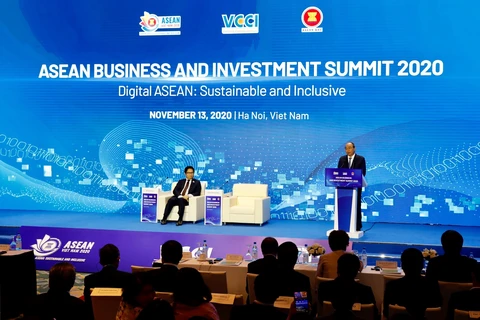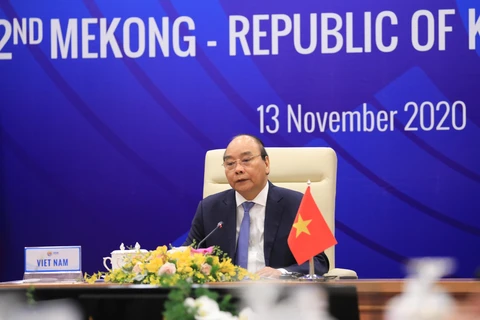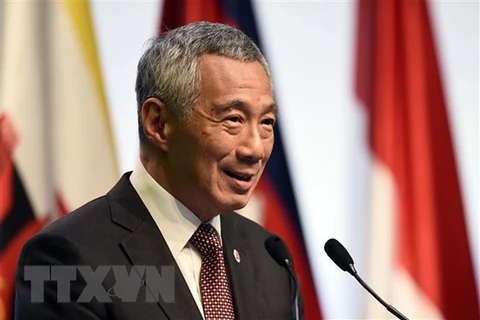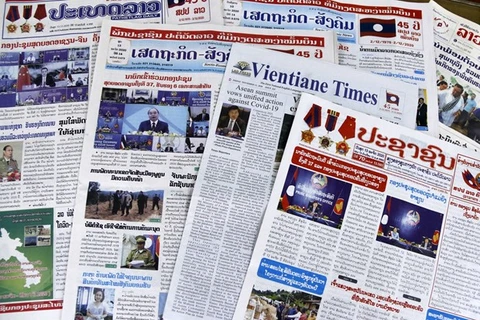Bangkok (VNA) – Prime Minister and Defence Minister of Thailand Prayut Chan-o-cha underlined the significance of multilateral cooperation in bringing COVID-19 under control and sustainable economic recovery while attending the online 12th Mekong-Japan Summit on November 13.
Prayut highlighted cooperation reinforcement between Mekong countries and Japan in three areas.
The first one is strengthening public health cooperation to drive the Mekong sub-region towards achieving Universal Health Coverage (UHC) scheme, in which Thailand stands ready to share experience with all member countries.
The Thai PM also emphasised the country’s advocacy of affordable and equitable access to medicines and vaccines, and to make them global public goods.
Secondly, the countries need to enhance connectivity to strengthen seamless, resilient, and sustainable sub-regional supply chains, especially through infrastructure development, in which Japan could take part in.
Prayut also underscored the importance of and Thailand’s endorsement on the drafting of a master plan to promote regulatory and digital connectivity.
Promoting sustainable development and grassroots development in the Mekong subregion is also among the areas. He expressed Thailand’s readiness to co-host with Japan the first Mekong-Japan forum on Sustainable Development Goals (SDGs), where Thailand is pleased to share experience on the New Economy and Sufficiency Economy Philosophy the country has been adopting to promote sustainable development without leaving anyone behind.
In conclusion, the Thai PM congratulated Japan’s declaration for 2021 to be Mekong-Japan Cooperation Year, hoping to work closely with Japan in enhancing security, prosperity, and sustainability of the Mekong region.
During the second Mekong-RoK Summit held earlier the same day, Prayut commended the RoK’s continued support to the Mekong-RoK Cooperation Fund (MKCF) and expressed readiness to support the RoK’s initiative to elevate Mekong-RoK cooperation.
The Thai PM highlighted the need to strengthen public health cooperation through sharing of experience and best practices in controlling the COVID-19 pandemic.
This is in line with the recently approved project proposed by Thailand, under the 4th Batch projects under the MKCF.
Thailand also supports the safe, efficient, affordable and equitable access to COVID-19 vaccines in the region, and the establishment of Universal Health Coverage (UHC) scheme, which is in line with the country’s policy to promote Public-Private-People Partnership, as well as Goal 3 of the SDGs.
Prayut also underscored the enhancement of connectivity to strengthen subregional supply chains.
Following the COVID-19 outbreak, there is a need to reconnect economies and the subregional supply chains which have been disrupted, and to promote the resilience of the supply chains to ensure sustainable post pandemic economic recovery.
On November 12, the Thai PM attended and delivered a speech via a teleconference at the ASEAN Women Leaders’ Summit under theme “Women’s Role in Building a Cohesive, Dynamic, Sustainable and Inclusive ASEAN Community in a Post COVID-19 World”.
According to Thai Government spokesperson Anucha Burapachaisri, while addressing the event, PM Prayut commended Vietnam for recognising the importance of continually strengthening the capacity of women.
A wide range of views has been exchanged with fruitful conclusions at the ASEAN Leaders’ Special Session on “Women’s Empowerment in the Digital Age”, recently held this past June, contributing towards achieving the ASEAN Community Vision 2025.
The Thai Government has implemented various measures to alleviate the suffering of women who are affected by social and economic impacts.
He suggested two issues that ASEAN needs to prioritise, in particularly, accessibility to capital and digital technology should be facilitated, in order to strengthen the role and capacity of women who own MSMEs to generate income and become self-reliant through the adaption of business development strategies to correspond with the COVID-19 situation.
Furthermore, women’s role in public health should be promoted, both during and after the pandemic. In June, the Thai PM underlined the role of women as Village Health Volunteers, who have made a significant contribution in containing the spread of infection in local communities.
It is evident that the efforts carried out by millions of Thai women as Village Health Volunteers provides a strong foundation on which the Thai public healthcare system is based, and that they have become an important factor for Thailand in managing COVID-19 infections to a satisfactory level./.
























